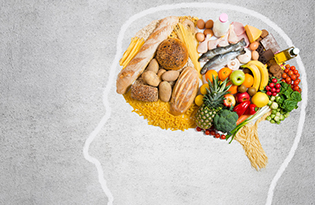Food for thought: Easy ways to nourish your brain
6/25/2025 by Samantha Toy

When it comes to eating for health, nutrition tips are mainly geared toward things like heart health, muscle function and bone health. However, the foods you eat can also affect your brain's functions. Cognitive health, which impacts your ability to think, learn and focus, can be enhanced by key nutrients often missed or forgotten in the everyday diet. Here are some tips on foods to incorporate into your meals to keep your brain sharp and healthy.
Go fish!
Salmon, tuna and sardines are high in omega-3 fatty acids. These fats are commonly referred to as “essential” fats, which means your body cannot produce them and must get them from foods in your diet. Omega-3 fatty acids are essential for brain development, function, and aging. Not a fan of fish? No worries! You can also get omega-3s from flaxseeds, chia seeds, hemp seeds, walnuts and almonds. Add them to salads or pack them as a quick midday snack!
Eat the rainbow
You might have heard that fruits and vegetables contain many good nutrients for your immune system. Vitamins (like C and E) and minerals are also great for your brain. They protect brain cells from harmful things like inflammation and stress. Foods like oranges, bell peppers and broccoli are rich sources of vitamin C. Spinach, avocado and kiwi are great examples of things with vitamin E. Adding more colorful fruits and vegetables to your meals, like a fruit salad or stir-fry, is a simple way to boost your brain power.
Protein power
Protein isn’t just for muscles; it’s also vital for brain health! The amino acids found in protein foods act as building blocks for chemicals in your brain, which are essential for mental and physical health. These chemicals allow your brain to communicate with your body, helping you to think, remember, sleep and digest. Excellent protein sources include lean meats (like chicken, turkey or fish), eggs, beans, lentils and tofu. A grain bowl for lunch or an egg/tofu scramble for breakfast are easy, brain-healthy options.
Fill your cup
This may surprise you, but your brain (and body) is 75% water. Staying hydrated gives your brain energy to concentrate and remain clear. If your mind feels foggy or unfocused, add more liquid fuel to your day. Foods like cucumbers, watermelon and celery have a lot of water, and every bit counts. Another trick is to keep a water bottle in your car to sip on during your commute to work. If you don’t like the taste of water, fruit or mint can add a little flavor boost. Sparkling water is also a great option.
Like your heart and muscles, your brain needs nutrients to fire on all cylinders. A well-balanced diet with healthy fats, fruits and vegetables, protein, and water can improve memory, learning and attention. It may seem daunting to make all these changes, but small switches over time can have a powerful effect on your brain health. Ultimately, it’s all about what you can add to your diet, not what you should takeaway!
Samantha Toy is a dietetic intern at Mayo Clinic in Rochester, Minnesota. She graduated from Bradley University with a bachelor’s in nutrition and dietetics and is pursuing a master’s in clinical nutrition at the University of Wisconsin-Madison. Her special interests include nutrition support, pediatrics and neurology.
